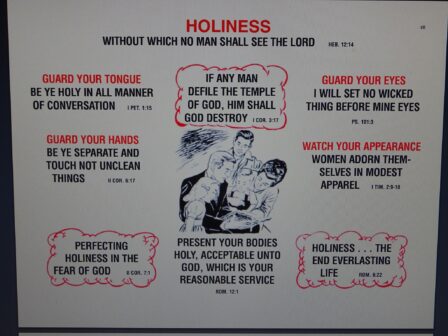Part One of Two Part Series
“To everything there is a season, A time for every purpose under heaven:
…..“A time to kill, And a time to heal; A time to break down, And a time to build up;”
Ecclesiastes 3:1,3 NKJV
When you’ve been in an abusive church for any length of time things are killed in your heart and soul and things are broken down in your mind and emotions. Eventually you become spiritually crippled and emotionally damaged. This is my story…
I was in the United Pentecostal Church all my life, that’s the only religion I ever knew and even though my mother never truly believed or conformed to the rules and regulations, that was where she took my brother and I to church on Sundays.
We went mostly to please my grandmother who was the matriarch of our family. She was a pro at shaming and putting on the guilt because she truly believed it was the only way to be saved and she prayed diligently for her family. Although I was the “strange” granddaughter with an analytical and inquisitive mind; always asking questions about why the church believed this way or where was this rule in the Bible, she just wanted me filled with the Holy Ghost and that would answer all my questions. I found out later that she couldn’t tell me where the rules and regulations were located in the Bible either, but she remained dedicated and faithful unto the end.
I was baptized in 1969 and received the Holy Ghost 2 years later at Youth Camp. But my mother didn’t believe the standards were necessary and got angry with my grandmother for making me dresses and skirts. It was a very confusing time in my life and although I had received the Holy Ghost, I still couldn’t find answers to my questions.
I remember finding and reading 1 Corinthians 11: 1-15 regarding women having long hair and I noticed when they preached on long hair this was the reference that they used and always stopped at verse 15. But if you read verse 16, Paul says, “But if anyone seems to be contentious, we have no such custom, nor do the churches of God.” Which basically says we don’t have this belief and it’s not a big deal. But I held my peace because it was just easier.
Because I was pulled between pleasing my mother and my grandmother I was in and out of church throughout my teen years. I got involved with after school clubs and was a Pom Pom girl my last two years of high school. God and church were on the back burner for me.
I married my high school sweetheart, a nice non-practicing Catholic at age 18. My UPC family members were horrified and my grandmother was very disappointed because she had been praying for me to marry a minister. His family was just as horrified that I was not a nice Catholic girl.
To keep the peace we were married in a chapel and the ceremony was performed by my UPC uncle. Our son was born 2 years later when I was 20 and we were ripe for the picking when we had our son dedicated in the UPC church.
This was 1977 and the church was still involved with evangelism and we were sucked in with all the other young married couples and gave our lives to the Lord…or so we thought…we really gave our lives to the church. My husband was baptized but hadn’t received the Holy Ghost and once again I started wearing the dresses and skirts, got rid of the make up and put away my jewelry. Since it was the 70’s I still had long hair. Once again I couldn’t explain the standards to my husband nor where to find them in the Bible.
My husband was transferred to another state in 1978 and we found a UPC church close to our home and started attending and they became our family. My husband was filled with the Holy Ghost and we had several couples that we considered close friends and we thought life was good.
It was here when the abuse began….the dictatorship…. we couldn’t miss church without calling the pastor, or go on vacation without prior notice, and the pastor didn’t like women working outside the home and leaving their children to be raised by strangers and of course I worked and was beginning a good career. Our pastor had a thing about cleanliness and would make surprise visits to your home and put a pair of white gloves on looking for dust. Our home was hit several times because he was trying to catch something on me to prove his point that women shouldn’t work. I became obsessed with a clean house and he never could make me his subject for a Sunday sermon.
I was put on the troublemakers list pretty early because I wanted answers to my questions about the rules and regulations and I even did my own research and wrote papers and gave them to my pastor and asked him to explain what I found. He would get very angry that I had the audacity to question his teaching and “convictions” he received from God. The only thing he would do is tell my husband to control his wife.
In 1982, after three miscarriages, we were blessed with a beautiful baby girl and our lives began to change and become more demanding. I began to teach Sunday School and I also became the pastor’s administrative assistant. He figured if I insisted on working I needed to work at the church. I really think it was because I was the only woman in church who could type and use a computer. I also was given a teaching position in the church’s Christian school and became friends with the other teachers who were not of the same faith. This was frowned upon because of our beliefs, but I persevered and held on to one friendship unto this day.
When my husband was called into the ministry, situations arose in the church. Instead of mentoring him, our pastor and his family felt threatened by my husband wanting to start a church somewhere in the state. Therefore we were not so kindly asked to leave the state and go back to Missouri, because he didn’t want “his” people leaving to attend my husband’s church.
In 1991 we loaded everything up and moved to Missouri to help my uncle in his UPC church to gain some experience. It was different to say the least. My uncle preached against everything. To him, if you spit wrong it was sin. I felt so trapped and stifled that I could hardly breath. We couldn’t even have a Christmas tree because he thought it was a sin.
Fortunately I was able to find a good job at a local college and one thing my uncle didn’t preach against was women working, because that meant more tithes. He knew everybody’s payday and like a bill collector he would knock on your door and collect your tithes. I loved my uncle but sitting under him for a year smothered me.
In 1994 a small church became available in a neighboring town and my husband was voted in as pastor. We had 9 in attendance our first service and 4 of them were our family. But those first few years were amazing. We saw new people coming in and being “saved” and our first fundraiser went to buy a baptismal tank.
My husband wasn’t hard on our people but he came down hard on our daughter and me. We had to make sure we were always dressed right and to sit and look pretty. Our son was to lead in worship by example and help wherever needed. When we went to sectional or district meetings, I was to be quiet and not talk or laugh and to keep my opinions to myself so he wouldn’t be embarrassed.
I continued to work for a few more years until the extra duties of the church, the District Ladies Ministry and the continued care of our children were too much for me and I became a full time pastors wife.
For a small church we were very active in puppet ministry, stick drama, choir, VBS, fall ladies tea, Easter and Christmas programs and community projects. The church grew to an average of 50-60.
I began teaching bible studies and the more I studied, the more concerned I became about what we were teaching. I voiced my concern to my husband but received a blank stare in return.
Around this time our church had some trouble and we had a split, losing a lot of people. This so upset my husband and I watched him change into a bitter and unforgiving man. He lost his joy and was letting the situation destroy him. I told him to rebuild or resign. He really just stopped doing anything.
Our daughter married a nice Pentecostal man (so we thought) in 2000 and our first grandchild was born in 2002. Then one weekend, while I was out of town helping our son move into an apartment where he was going to college, my husband did the unthinkable. He resigned the church, left me a note, emptied out our bank account and ran off with a worldly woman. I came home in shock with $12 in my purse. My life would be forever changed.
So I closed the books of the church and sat in several board meetings while they voted whether or not they were going to pay my bills for the month. I was so embarrassed but I made it through and turned in the church keys and left that town. It would be 18 years before I would go back.
With a lot of help from God and my parents, I was able to move my mobile home to a nice place in the St Louis area, file for divorce, and I secured a good job at a public accounting firm as an administrative assistant. I would eventually work my way up to Tax Supervisor before I retired in 2016.
Again I found another UPC church and started attending and tried to be a good Christian woman, although as a divorced woman I was marked. The married women were jealous if I even shook hands in greeting with one of their husbands and I was warned by the women to leave their husbands alone. I wasn’t interested in any man and I was hurt. Why couldn’t they see my heart was broken? That I had no interest in their husbands? Where was the love? Compassion? A pat on the back and a “hang in there!” would have been nice.
The pastor asked me to be the Ladies Ministry Leader for the church, which was odd because that position is usually for the pastor’s wife, but she didn’t want the position, so I accepted it. I was given a notebook of all the rules and regulations I was supposed to obey and be a “good example” for the ladies to follow. I don’t remember all of them, but being a faithful member and supporter of the church was close to the top, as well as dressing as becoming a godly woman and I was to exemplify the Proverbs 31 and Titus 2 women at all times. So I gave it a try and worked very hard for the next three years.
It was like pulling teeth to get the ladies to do anything or participate in any activity and they were not interested in Proverbs 31 or Titus 2. They were like the Stepford Wives. But they did enjoy honoring their pastor and his wife on pastor appreciation day and their birthdays and anniversary. They bought flowers and gifts and I tried making a suggestion on a gift but it was never good enough. One of the ladies told me that I just didn’t understand how much they all loved the pastor and his family, and they showed this by giving extravagant gifts and speeches, full of praise and honor. One year the church bough him a restored 1957 Chevy because he mentioned it was the ride of choice while he was dating his wife. I could understand why my suggestion of a $100 gift card to Bass Pro was turned down.
I never could get into the pastor worship and it seemed like idol worship to me and left a very bitter taste in my mouth. I managed to do three years as the ladies leader but I didn’t feel like I accomplished much. The ladies still acted like Stepford Wives, although I did manage to make one of the ladies that was in charge of the kitchen mad at me. So I resigned the position by submitting a letter and returning the notebook. Nothing was ever said to me about my resignation, nor about the three years I served. The pastor assigned his daughter-in-law to the position and she was hailed as the new leader and how she would do great things and etc etc.
I returned to college in 2003 to finish my Bachelors degree in accounting and going to school for the next three years, plus working full time and trying to be a good ladies leader, kept me busy. I remember telling the pastor (I learned never to ask) that I was enrolled in college and he was not pleased and thought it was a stupid idea. I told him I was single and needed to go to school so I could advance on my job and increase my earnings. Later I found out he wanted me to manage the church’s day care for $10.00 an hour. He thought that was enough for me to live on.
I persevered and graduated in June 2006 and received a promotion at work and a big raise, which increased my tithes significantly. I paid my tithes because I didn’t want to be put on “the list” that would get waved around during every sermon. He would be preaching and something would be said about tithes and he would pick up a list of names and wave it around yelling, “I have a list of names who are not paying your tithes. You are cursed with a curse and don’t come to me for help until you are paying your tithes because I can’t help you.”
It’s sad thinking back on those days and the people who were laid off and out of a job and couldn’t afford to put gas in their cars, much less pay their tithes. But couldn’t receive help from the church they supported for many years. Of course I understand that the new Lincoln pastor drove, and the fancy clothes and the newly remodeled home, was very important and needed tithe money to pay for them because they had an image to uphold….hmm.
Well with a promotion and big raise came more responsibilities and my work days became longer and I began missing the midweek services. Nothing was ever said to me for quite awhile and then only in passing that I was missed. I never thought much about that because as long as I wrote that check out every payday, attendance didn’t matter.
So after a year or so I was only attending Sunday mornings and by 2010, I was not going at all. It took the pastor 3 weeks to call me and I’m sure it was when my name came up on “the list.” When I told him I was not being fed the true word of God, and that in the 8 years I’d been attending he preached the same 9 or 10 messages and I named them: Tithes, women’s apparel, Tithes-The List, holiness, Acts 2:38, the coming of the Lord, communion, Tithes and attendance. He was offended, of course, and said some bad things to me about knowing better or something along those lines. I just said good bye and hung up the phone. I never felt freer than when I hung up that phone.
It was also during this time my daughter was going through a very messy divorce. Her husband was not a “good Pentecostal man,” but he never showed his bad side to the church and therefore it had to be my daughters fault and they took his side. I called and let them know very strongly about the abuse, the bruises and having to sneak my daughter and three granddaughters to a safe house for their protection. But it didn’t matter…the man is always right and they kept him in his positions at church and we were the outcasts.
That was my deciding factor that I was through with church and the Pentecostal ways. I knew in my heart that the doctrine was not “the truth” like we always heard; I had done enough research to know it. So my daughter and I never went back. I loved that taste of freedom.
Her ex-husband’s true nature was soon discovered when he was stalking a girl at the church and he started showing his creepy side and he was asked to leave. But we never received an apology, nor another phone call. Our days of being in a controlling cult was over and all I felt was relief.
I will end with this: When you’ve been in an abusive church for any length of time things are killed in your heart and soul and things are broken down in your mind and emotions. Eventually you become spiritually crippled and emotionally damaged….
Part Two will follow.
********
Shop at our Amazon store! As an Amazon Influencer, this website earns from qualifying purchases.






